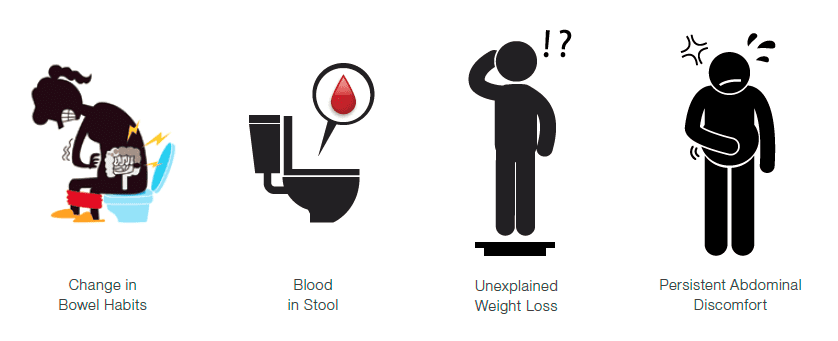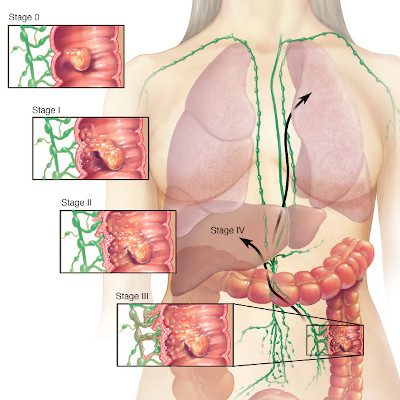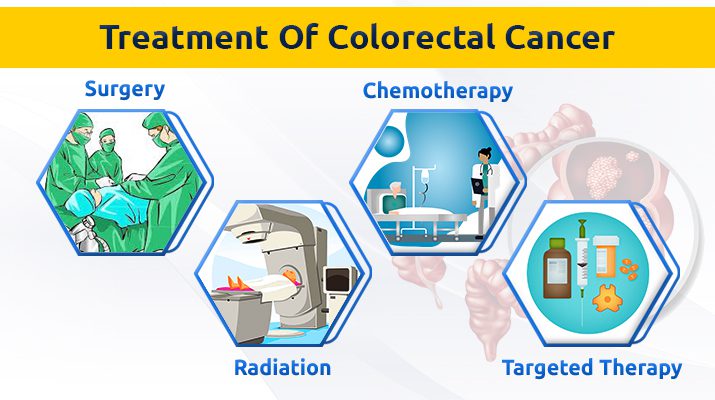What is Colon cancer
Colon cancer is a type of cancer that begins in the in the rectum or colon present in large intestine. These organs are the final part of the digestive tract. Colon cancer is also called colorectal cancer since it combines colon cancer and rectal cancer that begins in the rectum.
Colon cancer generally affects older adults; however, it can happen at any age. It starts as small and noncancerous polyps that develop inside the colon. Over a period these polyps can develop as colon cancers. That’s why it is suggested to undergo regular screening so as to rule out the disease in early stage, if identified polyps can be removed surgically before these convert into cancer.
Lets check what all are the signs of colon cancer and how it can be managed.
What are the signs and symptoms of colorectal cancer
Generally, patients experience no symptoms in the early stages of the colon cancer. The symptoms appear depending on the cancer's size and location in the large intestine. These symptoms may include:
- A persistent change in bowel habits such as diarrhoea or constipation
- Bleeding per rectum or bloody stool
- Excessive and Persistent discomfort in abdomen such as cramps, gas or pain
- A feeling of incomplete emptying of bowel
- Weight loss without trying
- Weakness
- Excessive bodily fatigue
- Vomiting
Patients may experience the following symptoms in addition in case colon cancer spreads to other parts of the body:
- Jaundice
- Difficulty in breathing
- Swollen Hands or feet
- Long lasting headache
- Blurred vision
- Bone fractures
“We Oncoplus Hospital, Delhi advise patients experiencing early signs to undergo screening before these signs worsen.”
What are the causes of colorectal cancer
Researchers are still working on finding the exact causing factor for colorectal cancer, however there are certain risk factors considered as responsible to contribute I the development of colorectal cancer.
- Gene mutations
Gene mutation is a term used for changes in DNA. When a cell’s DNA is changed or damaged, cells still divide to grow but abnormally developing a tumour. - Precancerous growths
Abnormal cells accumulate in the lining of the colon developing small and non-cancerous polyps. These polyps should be removed surgically to avoid the development of cancerous tumour.
Various risk factors responsible to contribute developing colorectal cancer are as follows:
- Older age: People who are older than 50 are at more risk of developing colorectal cancer.
- Personal history of bowel diseases
- Eating red meats or a diet high in processed foods. Colorectal cancer may be associated with a typical diet, which is low in fiber and high in fat and calories.
- People with a prior history of polyps or colorectal cancer are at a greater risk of colon cancer in the future.
- Inflammatory and chronic conditions of intestine such as ulcerative colitis and Crohn's disease make one at high risk of developing colon cancer.
- Inherited syndromes that are passed through generations can increase colon cancer risk. However, only a small percentage of colon cancers are linked to inherited genes.
- Anyone with a family history of colon cancer is likely to develop colon.
- People with sedentary lifestyle are more likely to develop colon cancer.
- People with diabetes or who are resistant to insulin have an increased risk of colon cancer.
- People who are overweight are at higher risk to develop colon cancer when compared with people considered normal weight.
- Smoking may increase the risk of colon cancer.
- More consumption of alcohol also increases the risk of colon cancer.
Book an appointment with the best oncologists for cancer treatment as well as diagnosis at best cancer Hospital in Delhi.
How to diagnose colorectal cancer
There are certain investigations recommended by the experts to screen people with either early signs or no signs in order to look for signs of colon cancer or noncancerous colon polyps. identifying colon cancer at its earliest stage helps the experts to manage the case in real time.
Any screening initiates with a medical and family history of the patient followed by a physical examination. Important tests, which are recommended to rule out the colon cancer are as follows:
- Blood tests: Blood tests do not rule out the have colon cancer, but blood test is required to look for the overall health of the patient such as kidney and liver function tests.
- X-ray
- CT scan: CT scans provides a detailed image of the colon.
- Colonoscopy: It is a procedure that involves the use of a long and flexible tube attached with a small camera. The specialist is able to see inside the colon and rectum to confirm anything unusual. In some cases if doctor finds something unusual, doctor can remove a tissue from abnormal areas which is sent to a laboratory for further analysis.
Determining the extent of the cancer
Staging in any cancer helps to determine what treatment options are most suited for a patient. After a thorough evaluation of the patient physically by the expert also through the investigations stages of colorectal cancer can be determined.
Stages of Colorectal cancer are listed as follows:
Stage 1: This is the early stage where the cancer has penetrated the lining of the colon or rectum but has not spread to the walls of organ.
Stage 2: At this stage, the cancer has spread to the walls of the colon or rectum but has not spread to the lymph nodes or surrounding tissues yet.
Stage 3: At this stage, the cancer has spread to the lymph nodes but not to other parts of the body yet.
Stage 4: This is the most advanced stage also critical one where the cancer has spread to other distant organs, such as the liver or lungs.
Treatment options for colorectal cancer
“Various treatment options available at Oncoplus Hospital, Delhi include Surgery, Chemotherapy, Immunotherapy, targeted therapy”. Let us have a detailed look:
Surgery for early-stage colon cancer
- Polypectomy: Surgery done to remove the small and non- cancerous polyp.
- Endoscopic mucosal resection: In this procedure, larger polyps are removed during colonoscopy using special tools.
- Laparoscopic surgery: Those polyps that cannot be removed during a colonoscopy procedure may be removed through laparoscopic surgery.
Surgery for more advanced colon cancer
In case of advanced cancer, surgery is done to relieve a blockage of the colon or other conditions in order to improve the symptoms such as a blockage, bleeding or pain.
In specific cases where the cancer has invaded into the liver or lung but overall health is good, surgery may be recommended to remove the cancer.
But if the cancer has spread to the colon, following surgical procedures are recommended:
- Partial colectomy: This procedure is conducted through laparoscopy. In this procedure, the surgeon removes the part of colon containing the cancer.
- Ostomy: This surgery involves creating a way for waste to excrete through patient’s body. It is carried out by creating an opening in the wall of abdomen from a portion of the remaining bowel for the excretion of stool into a bag that is fitted securely over the opening.
- Colostomy: Is done when patient does not get benefit from Ostomy.
- Lymph node removal: Surrounding lymph nodes are also removed during colon cancer surgery.
Chemotherapy
Chemotherapy uses medicines to kill cancer cells. If the cancer is larger or has spread to the lymph nodes, chemotherapy for colon or rectal cancer is typically given after surgery. After surgery ,chemotherapy may kill any remaining cancer cells in the body and help reduce the risk of cancer recurrence.
In addition, chemotherapy if given before surgery, it might shrink a large cancer so that it is easier to remove with surgery.
Radiation therapy
Radiation therapy uses powerful energy sources to destroy the cancer cells. In some cases, radiation is combined with chemotherapy to enhance the results.
Targeted drug therapy
This type of therapy focus on particular abnormalities present within cancer cells and block these abnormalities eventually killing the cancer cells.
Immunotherapy
Immunotherapy is a type of treatment that uses patient’s immune system to fight cancer. Patients with cancer has weak immune system that may not fight cancer because the cancer cells produce proteins that blind the immune system cells from identifying the cancer cells. Immunotherapy interferes with that process.
Palliative or Supportive care
Palliative care teams aim to improve the quality of life for patients with cancer. This form of care is offered alongside curative or other treatments a patient may be receiving.
Palliative care is specialized medical care that focuses on providing relief from pain and other symptoms of a serious illness. Palliative care is provided by a team of doctors, nurses and other specially trained professionals that work with patient, his/her family and patient’s other doctors to provide an extra layer of support that complements the ongoing care.



